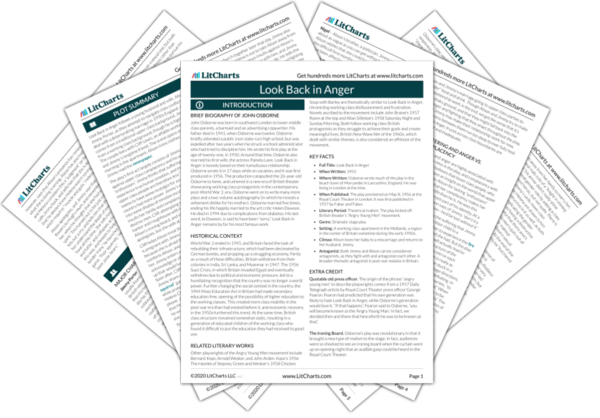Look Back in Anger is the archetypical play of the “angry young men” movement in British theater, which was marked by working class authors writing plays about their disillusionment with British society. In Osborne’s play, we see this in Jimmy’s sense of political emptiness. Jimmy complains that, in the Britain of the 1950s, “there aren’t any good, brave causes left.” Helena observes that he was born in the wrong time—“he thinks he’s still in the middle of the French Revolution.” Jimmy’s angry fervor is out of place in modern society, and this leaves him feeling useless and adrift. Other characters also feel a sense of nostalgia for the past, but for different reasons: they long for an era characterized by a leisurely life for rich Britons and greater worldwide power for the British Empire. Many of these themes of nostalgia revolve around Alison’s father, Colonel Redfern, who had served in the British army in colonial India. Jimmy says that Colonel Redfern is nostalgic for the “Edwardian” past — early 20th century England, before World War I, when things were supposedly simpler and more peaceful.
In the end, the play argues that the characters’ disillusionment is legitimate. Post-war Britain was marked by a stagnant economy and declining world power, partly due to the fact that it no longer had many lucrative colonies around the world (India, where Colonel Redfern served, gained its independence in 1947). The play argues that these factors have left the country’s young people adrift and disempowered. Jimmy’s anger is therefore justified. Both Jimmy and Colonel Redfern, from their different places in society, have nostalgia for a time when Britain was more powerful on the world stage. The passing away of Britain’s imperial power is thus painted in a negative light—and though Look Back in Anger voices a revolutionary social critique of class conditions in England, it stops short of criticizing Britain’s exploitation of its colonies. Instead, it argues that the decline of the empire has led to the disenfranchisement of the men of Osborne’s generation, and gives those disenfranchised citizens a strong and angry voice in Jimmy Porter.
Disillusionment and Nostalgia ThemeTracker

Disillusionment and Nostalgia Quotes in Look Back in Anger
I hate to admit it, but I think I can understand how her Daddy must have felt when he came back from India, after all those years away. The old Edwardian brigade do make their brief little world look pretty tempting. All homemade cakes and croquet, bright ideas, bright uniforms…What a romantic picture. Phoney too, of course. It must have rained sometimes. Still, even I regret it somehow, phoney or not. If you’ve no world of your own, it’s rather pleasant to regret the passing of someone else’s.
I can’t think what it was to feel young, really young. Jimmy said the same thing to me the other day…I suppose it would have been so easy to say “Yes, Darling, I know just what you mean. I know what you’re feeling.” It’s those easy things that seem to be so impossible with us.
One day, when I’m no longer spending my days running a sweet-stall, I may write a book about us all…and it won’t be recollected in tranquility either, picking daffodils with Auntie Wordsworth. It’ll be recollected in fire, and blood. My blood.
I always believed that people married each other because they were in love. That always seemed a good enough reason to me. But apparently, that’s too simple for young people nowadays. They have to talk about challenges and revenge. I just can’t believe that love between men and women is really like that.
You’re hurt because everything is changed. Jimmy is hurt because everything is the same. And neither of you can face it. Something’s gone wrong somewhere, hasn’t it?
I suppose people of our generation aren’t able to die for good causes any longer. We had all that done for us, in the thirties and the forties, when we were still kids. There aren’t any good, brave causes left.
















